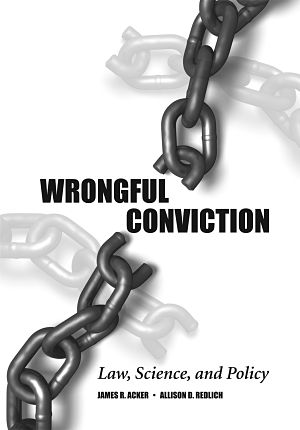UAlbany Professors Explore the Moral and Legal Ramifications of Wrongful Convictions
ALBANY, N.Y. (December 27, 2011) – Hundreds of individuals erroneously convicted of rape, murder, and other serious felonies, many of whom spent decades in prisons and/or were under sentence of death, have been exonerated by DNA evidence. Some studies estimate that wrongful convictions in the U.S. occur in as many as 3 percent or more of felony cases. The actual number of innocent people convicted of crimes is unknown and perhaps unknowable. Given that more than one million felony convictions and considerably more misdemeanor convictions occur annually, the number of persons wrongly convicted is potentially staggering. University at Albany researchers James R. Acker and Allison D. Redlich delve into this complicated subject matter in their new book, Wrongful Conviction: Law, Science, and Policy (Durham, N.C.: Carolina Academic Press, 2011).
Acker and Redlich, both faculty at UAlbany's top-ranked School of Criminal Justice, address issues of law, science, and policy related to wrongful convictions in the American justice system. The materials are organized in the form of a casebook, comprising edited judicial decisions and complementary materials from psychology, criminal justice, and related disciplines. Their volume is the first of its kind.
Wrongful Conviction: Law, Science, and Policy also includes detailed analyses of forensic science, jailhouse snitches, false confessions, prosecutorial misconduct, ineffective defense counsel, unreliable eyewitness accounts, and a plethora of compelling case studies.
 |
|
James Acker and Allison Redlich, both faculty at UAlbany's top-ranked School of Criminal Justice, address issues of law, science, and policy related to wrongful convictions in the American justice system. |
The authors conclude that while many of the problems contributing to wrongful convictions are well known, criminal justice systems are still struggling with remedies. Acker and Redlich suggest and remind that while reforms are possible and ongoing, considerably more can and should be done to prevent, detect, and redress wrongful convictions.
James R. Acker has extensive scholarship in areas of death penalty law and the judicial uses of social science research. He has co-authored a series of articles examining capital punishment legislation, which appeared in the Criminal Law Bulletin, and is co-editor, with Robert M. Bohm and Charles S. Lanier, of America's Experiment With Capital Punishment (Carolina Academic Press, 2d ed. 2003). He is the co-author, with his daughter Elizabeth, of Two Voices on the Legal Rights of America's Youth (Wadsworth Publishing, 2004). In 2005, Acker, a University Distinguished Teaching Professor, helped establish the University's National Death Penalty Archive (NDPA), the nation's largest repository of archival material devoted solely to the death penalty. With Professor Redlich and others, he is on the Board of Editors of the Albany Law Review’s annual Miscarriages of Justice issue, the result of a unique, interdisciplinary collaboration between the School of Criminal Justice and the Albany Law Review.
Prior to joining the School of Criminal Justice, Allison D. Redlich was a senior research associate at Policy Research Associates, and a research scientist at the Stanford University School of Medicine. She received her doctorate in developmental psychology from the University of California, Davis. Professor Redlich is an internationally recognized expert on police interrogations and false confessions, particularly with vulnerable populations such as persons with mental illness and juveniles. Her research has been funded by the National Science Foundation, the National Institute of Justice, the John D. and Catherine T. MacArthur Foundation, and NARSAD: The Mental Health Research Association. Professor Redlich is a member of the Advisory Board of the Center on Wrongful Convictions of Youth, and has served on the Executive Committees of the American Psychology-Law Society and the Society for Child and Family Practice and Policy.
![]() For more news, subscribe to UAlbany's RSS headline feeds
For more news, subscribe to UAlbany's RSS headline feeds
A comprehensive public research university, the University at Albany-SUNY offers more than 120 undergraduate majors and minors and 125 master's, doctoral and graduate certificate programs. UAlbany is a leader among all New York State colleges and universities in such diverse fields as atmospheric and environmental sciences, business, education, public health,health sciences, criminal justice, emergency preparedness, engineering and applied sciences, informatics, public administration, social welfare and sociology, taught by an extensive roster of faculty experts. It also offers expanded academic and research opportunities for students through an affiliation with Albany Law School. With a curriculum enhanced by 600 study-abroad opportunities, UAlbany launches great careers.


